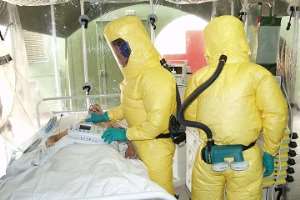
The outbreak of Ebola in the northeast of the Congo is not yet under control after almost three months, reports MSF aid agency. Conflicts and mistrust create challenges in the fight against the virus. "People are afraid to be treated."
The disease broke out in August in the border area with Uganda and Rwanda. Rob de Clercq, a nurse for Doctors Without Borders, has been working as a nurse at a treatment center in Mangina for four weeks, the epicenter of the outbreak. "The treatment center actually only consists of tents that are covered with plastic," he says about his experiences.
Organ trade
The tent camp has been built up openly. "People can see from a distance what we are doing, which is necessary because there are a lot of misunderstandings within the community," says De Clercq.
There are fear and conspiracy theories going around. "People think, for example, that we would deliberately kill residents in order to trade organs."
According to the nurse, it is crucial to remove the distrust. "We try to be very open and transparent to the public about what Ebola is and what we do, which is very important because people often wait too long for help and we can not help them anymore."
Ebola is known worldwide when there was a major outbreak in West Africa in 2014. A total of 11,000 people die from the virus, most of them in Guinea, Sierra Leone, and Liberia. Ebola is a contagious disease that is often fatal. At present, about two of the three infected patients still die.
After the previous outbreak in 2014, a vaccine has been developed. More than 11,000 inhabitants have been vaccinated over the past period. Nevertheless, 118 people have already died from the virus in the new outbreak in Congo.
To inform
From the first moment someone comes to the treatment center, the care providers give a lot of explanation. "At the first meeting there is a doctor, a nurse, and a psychologist, and the psychologist explains what is going to happen."
If someone agrees to be treated after the explanation, two nurses, fully dressed in the yellow-white suit, take the sick person to one of the tents. "We take blood samples and examine them in the laboratory in the tent camp, and then we know within 2-3 hours whether someone has Ebola."
Violence
Since the previous major outbreak in 2014, a vaccine has been available. "You want to map the contacts of a patient and hand out vaccinations," says de Clercq. That is difficult because there is a lot of unrest in the area of the outbreak. It is dangerous because of attacks by rebel groups, causing many people to flee.
"The outbreak is very difficult to curtail because people are actually constantly on the run. It is almost impossible to find out all the contacts of an Ebola patient. We may also not start active searches. There are full no-go zones, because of the violence ", says de Clercq.
Experimental treatment
De Clercq only works in the treatment center. Until recently, no treatment was possible, now for the first time in the Congo experiments with medicines. "We have four experimental treatments that are chosen patient-dependent. It is still fully in the research phase ".
When a patient is healed, he or she is escorted home. "We have special care providers who accompany the patient to their village, explaining that the person is no longer in danger and that you can just touch them," says Rob.
Yet people who are healed sometimes come back to the camp. "We put people who are healed, and thus immune to the disease, to accompany the sick and to take away their fear."




 Whoever participated in the plunder of the state must be held accountable – Jane...
Whoever participated in the plunder of the state must be held accountable – Jane...
 A vote for John and Jane is a vote to pull Ghana from the precipice of destructi...
A vote for John and Jane is a vote to pull Ghana from the precipice of destructi...
 I’ll repay your abiding confidence with loyalty, understanding and a devotion to...
I’ll repay your abiding confidence with loyalty, understanding and a devotion to...
 ‘I’ve learnt deeply useful lessons for the future' — Serwaa Amihere breaks silen...
‘I’ve learnt deeply useful lessons for the future' — Serwaa Amihere breaks silen...
 I’m sorry for the embarrassment – Serwaa Amihere apologises for leaked sex video
I’m sorry for the embarrassment – Serwaa Amihere apologises for leaked sex video
 Dumsor: Matthew Opoku Prempeh not in charge of Energy sector – Minority
Dumsor: Matthew Opoku Prempeh not in charge of Energy sector – Minority
 Adu Boahen’s murder: Police arrest house help who was in possession of deceased’...
Adu Boahen’s murder: Police arrest house help who was in possession of deceased’...
 Akufo-Addo nominates Felicia Attipoe as Tema West MCE
Akufo-Addo nominates Felicia Attipoe as Tema West MCE
 Election 2024: I can't have someone I defeated twice as my successor – Akufo-Add...
Election 2024: I can't have someone I defeated twice as my successor – Akufo-Add...
